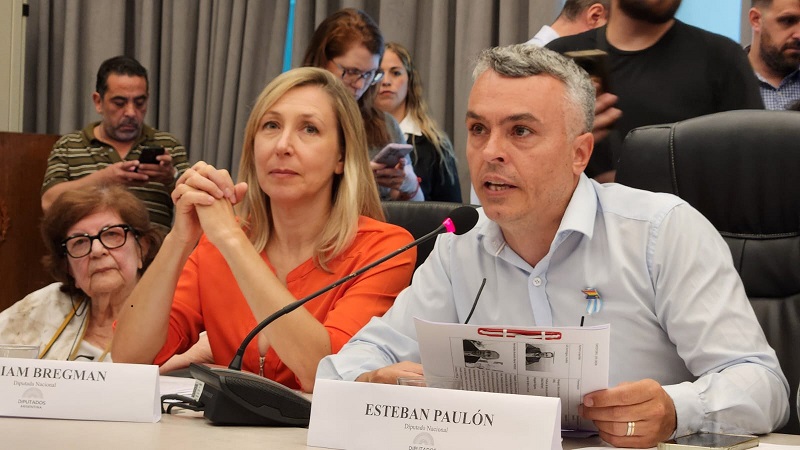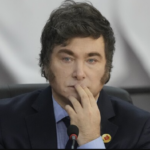
In the annex of the Chamber of Deputies, legislators from different blocks called on jurists, academics and lawyers’ organizations to participate in the debate on the Decree of Necessity and Urgency 70/2023. The mega DNU by which the Government repealed almost a hundred laws and modified around 300 other regulations.
The public hearing was called by deputies from Unión por la Patria, the Frente de Izquierda Unidad and the Socialist Party, which is part of the We Make Federal Coalition bloc. It was a first sign of the opposition in the lower house, after Caputo himself and other officials came out to recognize “flaws” in the decree, such as the huge increases by prepaid companies, and after the Senate ended up defining its rejection .
The presentation of the speakers was led by Myriam Bregman (Frente de Izquierda), Esteban Paulón (Socialismo HCF) and Leopoldo Moreau (UP). Radical deputies who have been showing their differences with the bloc chaired by Rodrigo de Loredo also joined, such as Pablo Juliano, Natalia Sarapura, Jorge Rizotti, Marcela Coli and Pedro Galimberti, aligned with the deputy Facundo Manes, who reported that he could not be present for agenda issues. Fernando Carbajal, also from the UCR, said that he could not attend due to the cancellation of his flight. On the side of the bloc led by Miguel Ángel Pichetto, there were deputies Margarita Stolbizer and Natalia de la Sota and Esteban Paulón from Santa Fe.
Myriam Bregman, lawyer and national representative, questioned the DNU and stated that: “The decree affects the lives of thousands of people with the repeal or modification of the Rental Law, Land Law, labor rights, deregulation of prepaid bills and drug prices, among others. Now Caputo is scared about how market freedom acts”. The deputy of the Unity Left Front added that “for us, its treatment in this Chamber is urgent: it has to be immediate, next week if possible. This day is not to delay, but quite the opposite, to demonstrate that its treatment is imperative, because in addition to any political consideration it is illegal.”
He also stressed that “We are against the existence of the Decrees of necessity and urgency since the reform of ’94but even the Constitution considers them as something exceptional, and in this case the exception becomes the rule, due to the quantity and quality of laws it modifies. The emergency is given because Law 26,122 protects the DNU. Despite the rejection of the Senate, the DNU remains in force. The DNU, together with the Omnibus Law, constitute a very serious precedent that we will continue to face with the mobilization, and calling for this Chamber of Deputies to meet to reject it.”
Esteban Paulon, a socialist legislator, said “from socialism, together with a plural group of legislators, we always raise its unconstitutionality and the serious consequences it produces on the Argentine economy. For this reason, we are working to reject it in the Deputies.”
Conference in @DiputadosAR together with constitutionalists to analyze DNU 70/2023.
From socialism we always raise its unconstitutionality and the serious consequences it produces on the Argentine economy. For this reason, we are working to reject it in the Deputies. pic.twitter.com/fXSEvmtbTx
— Esteban Paulon 🌈💚 (@EstebanPaulon) April 9, 2024
Christian “Chip” Castle, sociologist and national deputy for the Unidad Left Front, denounced the number of Milei government officials who are part of large companies, such as Techint and those owned by the América group chaired by Eduardo Eurnekián. “This DNU was behind the price increases, it is behind the increases in medicines, which were totally deregulated, it is behind the increase in prepaid bills, fuel. It is behind a brutal transfer of income from the working class to someone of the most concentrated business sectors that are part of the government”, he added that “Congress has deserted its task of annulling this manifestly unconstitutional DNU”, he also stressed “this Congress can desert as much as the street allows. If there are millions in the streets are swept away by all that maneuver.” He ended by demanding that Congress meet and that that day there must be a strike with mobilization called by the CGT and the CTA and “that millions in the streets force the annulment of this DNU. It is an interest of the working class since the heart of the DNU is the attack on the rights of the working class.
During the debate, constitutional lawyers explained the irregularities of Milei’s decree, which was already rejected in the Senate. Also, during the hearing, law 26,122 that regulates the legislative treatment of the DNU, whose author is former senator Cristina Fernández de Kirchner, was questioned.
Eduardo Barcesat, Constitutionalist lawyer, requested the annulment and not the repeal of the DNU and said that the document bearing Milei’s signature establishes “a silent genocide that means a growth in poverty and hunger as a result of the forced exclusion and marginalization of the great majorities.” .
Beatriz Rajland, constitutional lawyer, maintained that “there is no need, nor urgency nor any impediment for Congress to function. This DNU is nonsense, a legal aberration, nonsense,” and added that “laws that make up a legal plexus are repealed and modified over many years of conquest and expansion of rights”.

Pablo Manili, doctor and postdoctoral in Constitutional Law, stated that “if the Court abides by its precedents this has to be declared unconstitutional,” and added that “How did the Court interpret this matter of exceptional circumstances? In the “Video Club Dreams” ruling, said, ‘there must be a serious social risk’; the “Della Blanca” ruling said ‘the DNU must be necessary to preserve the very life of the Nation’; in the “Tobar” ruling he said that ‘there must be a serious disturbance economic, social or political that represents the maximum risk for the country; in the “Leguizamón Romero” case he said that ‘they can only be dictated when there are situations of serious disorder that threaten the existence, security, or public or economic order, which must be conjured without delay.’ None of these requirements, as interpreted by the Court, are met.”
Laura Clérico, UBA teacher, researcher: “Any person who reads the National Constitution in its Art. 99 inc. 3 has to conclude that the DNU must be rejected by Congress.”
Gustavo Ferreyra, Constitutionalist lawyer: “I never thought I would find myself involved in an attempt to destroy the Constitution of the Argentine Republic.”
Antonio María Hernández, constitutional lawyer: “Decree 70/23 is grossly unconstitutional. It is an expression of hyperpresidentialism.” Faced with this, he stated that “this is the time for Congress. Just as the Senate of the Nation left it void, the Chamber of Deputies of the Nation must do the same.”
Andres Gil Domínguez, constitutional lawyer: “Why does DNU 70/2023 not meet the requirements? Because President Javier Milei, through the theory of proper acts, demonstrates it. If one observes the recitals we will observe that there was no situation unpredictable or unexpected. Because the president himself says that with this DNU he comes to overcome a situation that began in 2013.”
The former legislator Jorge Yoma He considered that the DNU “is fallen”, because one of the Chambers rejected it. In fact, this is not the case, because the regulatory law only indicates that it is invalidated if it is so decided in both venues.
The law that regulated the legislative treatment of the DNU, whose author is former senator Cristina Fernández de Kirchner, was questioned during the public hearing. Said regulation establishes that for a presidential decree to fall, the explicit rejection of both chambers of Congress is necessary, but for it to remain in force it is enough for only one to approve it or for there to be no pronouncement. That is why, even though it was recently rejected in the Senate, the DNU remains in force and is what allows, for example, prepaid companies to have indiscriminate increases.
Source: www.laizquierdadiario.com

